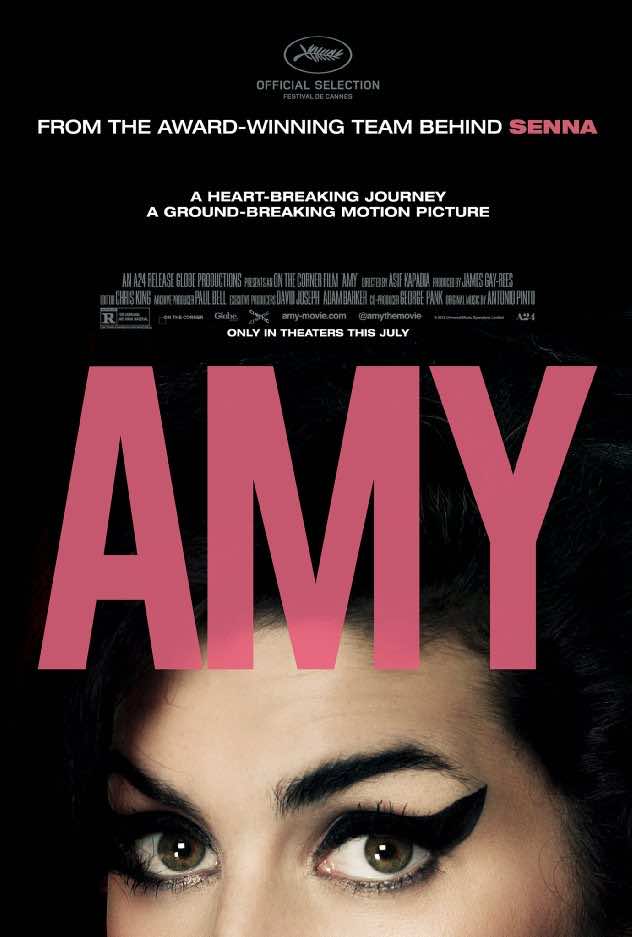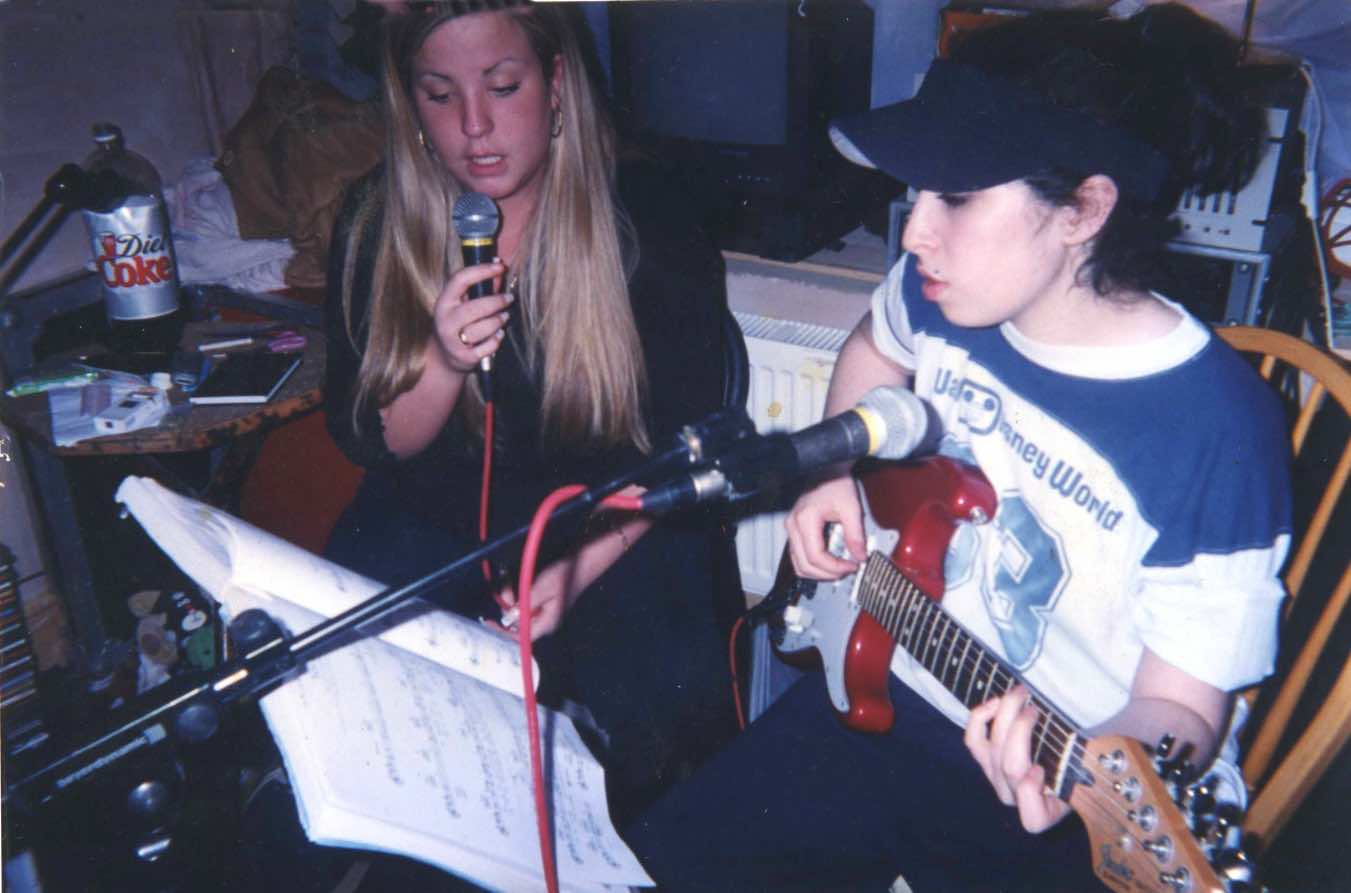 You don’t need this movie to show you Amy Winehouse was an independent spirit at heart, but feature filmmaker turned documentary filmmaker Asif Kapadia hits the respectable notes in his mostly chronological documentary, Amy. As she came to fame, Winehouse spoke frankly with the BBC’s Russell Harty about her refusal to be packaged as a commodity by the management company that gave us The Spice Girls. She also says she hates pop music and admires jazz above all, a music scene she made no apologies for as elitist and unfit for the massive open air shows she would ultimately headline. She did her best to be relatable, calling her breakout second album, Back to Black, an accessible record because it was not as jazzy as her first album, Frank.
You don’t need this movie to show you Amy Winehouse was an independent spirit at heart, but feature filmmaker turned documentary filmmaker Asif Kapadia hits the respectable notes in his mostly chronological documentary, Amy. As she came to fame, Winehouse spoke frankly with the BBC’s Russell Harty about her refusal to be packaged as a commodity by the management company that gave us The Spice Girls. She also says she hates pop music and admires jazz above all, a music scene she made no apologies for as elitist and unfit for the massive open air shows she would ultimately headline. She did her best to be relatable, calling her breakout second album, Back to Black, an accessible record because it was not as jazzy as her first album, Frank.
Kapadia worked with a team of editors with access to home video footage provided by family members as well as footage from every source imaginable — from paparazzi shots to YouTube fan footage to broadcast TV appearances — to splice together an intimate story about Winehouse’s all-too-speedy rise to fame and acclaim, then into a period of brutal rejection by the pop culture media machine and her untimely death. It’s remarkable how grounded Amy feels from moment to moment. Early on, Winehouse comes across as a mischievous child, as we meet her singing “Happy Birthday” with a voice that spontaneously takes over the room and draws in the camera. What’s so painful to watch is how her personality gradually loses its luster over the course of the film. The more attention she received, the more she disappeared. It’s a heartbreaking thing to watch, until she pulls that ultimate disappearing act. It was a tragic loss for the music world because that Back to Black album was too good and too human for the popular music scene she got trapped in, the chorus of the hit single “Rehab” co-opted into an ironic, frivolous joke when referencing her hard times.
That song came from a sincere place, and there’s little room for its complexity and humanity in the often flippantly referential pop music world. While her public downfall was transmitted in 15 second updates on entertainment news shows, this documentary grips you with its near two-and-half-hour run time, inviting the viewer to contemplate the person behind the tunes. I would never posit any documentary transmits a true portrait of anyone. The story it wants to tell are in the choices the director makes when he cuts together his footage. With one splice in an image, a filmmaker will exert editorial vision.
From the start, Amy seeks to make the audience aware of Winehouse’s penchant for drinking and partying as well her attraction to drugs and toxic relationships. Her father, Mitch Winehouse, is vilified as an absent parent who jumped back into her life with her success. He has famously protested the director’s alleged decision to cut short a certain statement in the film where he declares his daughter didn’t need rehab. He told “The Guardian” his soundbite was edited to remove context: “What I said was: ‘She didn’t need to go to rehab at that time.’ … They’ve edited me out saying ‘at that time’.”
Let that serve to prove that there is no such thing as a genuinely objective documentary, and let’s be honest, this film was built in the editing room. However, the big picture of Winehouse’s stratospheric rise to fame where she flamed out is sharply presented.  There’s no denying the cruelty of ill-informed soundbites on late night TV and gossip shows would hurt a person such as Winehouse, who never made fame the priority over her craft. She prided herself in writing her own lyrics, based on her own experiences (she titled her first album Frank for a reason). During her rise as a pop culture icon, she appeared on “The Tonight Show” to sing “Rehab.” Jay Leno is seen complimenting her at the end of her performance. Later in the film, during her downfall, Kapadia edits in footage of another episode of “The Tonight Show,” months later. During his opening monologue, Leno cracks a joke about her drug abuse and the camera sweeps over the massive audience breaking out in laughter.
There’s no denying the cruelty of ill-informed soundbites on late night TV and gossip shows would hurt a person such as Winehouse, who never made fame the priority over her craft. She prided herself in writing her own lyrics, based on her own experiences (she titled her first album Frank for a reason). During her rise as a pop culture icon, she appeared on “The Tonight Show” to sing “Rehab.” Jay Leno is seen complimenting her at the end of her performance. Later in the film, during her downfall, Kapadia edits in footage of another episode of “The Tonight Show,” months later. During his opening monologue, Leno cracks a joke about her drug abuse and the camera sweeps over the massive audience breaking out in laughter.
The movie is long, and if there was one section that felt like it dragged it was during the presentation of the entire footage –with the camera focused on Winehouse — as all the Grammy nominees for Record of the Year are read. It’s interesting to watch Winehouse’s blasé attitude to the nominees, which included Carrie Underwood and Rihanna. Then, when her name is announced, we get to see her surprise, a moment captured in all the trailers for this movie. At this point in the movie, one should feel a keen ambivalence to the pop music machine, as well, so it becomes a bitter-sweet moment.
Amy is a craftily constructed experience, but it never reduces Winehouse to a victim of her circumstance or her addictions. As much as I like to single out the terrors of the mass media machine, Winehouse’s story is a complicated one. An array of characters in her life, some poisonous some supportive, provide voice-over narration over all the archival footage (there are no talking heads, beyond Kapadia’s found footage). She came from a home that was both broken but also tolerant. There are moments in the studio or her composing in her notebooks that reveal Winehouse in zones that show an artist focused but relaxed in her craft. She seems incredibly distinct in how she approached the guitar and her voice. It’s also nice to know a lot of that happened in Miami, away from the tensions of London.
With Amy, Kapadia has assembled an utterly tragic story about a truly talented young woman who went down the wrong slide of the music industrial complex. A sense of tragedy looms over the entire thing. Success is many things, but beware popularity. There hasn’t been a film that depicts the idea of “the build you up to tear you down” as vividly as Amy, which is an ultimately heartbreaking film.
One more screening update: Amy continues to be a hit in South Florida. It makes another visit to another O Cinema theater, now coming to Miami Shores: details here.
Amy runs 128 minutes and is rated R (lots of “common” talk and drug use). The film has been playing in our Miami area for awhile, and is scheduled to continue its run through Aug. 6 (Update: Amy‘s run has been extended again at our local theaters, until Aug. 13 at O Cinema Wynwood and Aug. 14 at Tower Theater). Tower Theater invited me to a screening for the purpose of this review. It’s playing in many locations and is already a bonafide indie hit (check out its box office) for A24 Films. If you live in other parts of the U.S., follow this link for other screening locations. All images courtesy A24.












I feel your article is spot on. Saw the film a few weeks ago, and it really was bittersweet. Such a raw talent and alluring soul was Amy.
Thanks. It was a heartbreaking film but those scenes of her working it were wonderful.